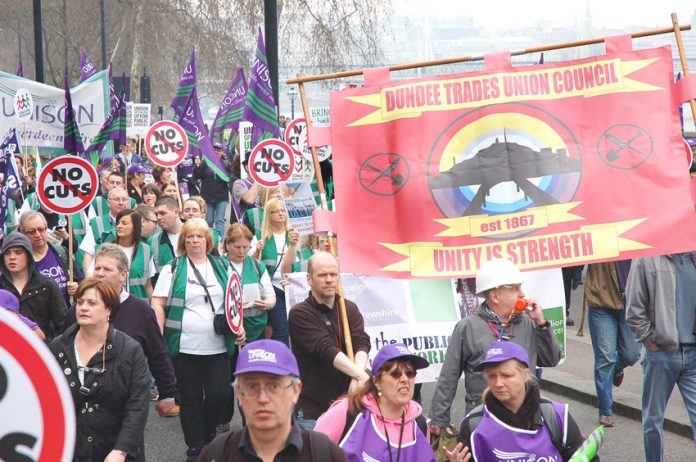
EARLY yesterday morning it was officially declared that the Scottish Nationalists were defeated as Scotland voted to stay in the United Kingdom after the majority of voters rejected independence.
With the results in from all 32 council areas, the ‘No’ side won with 2,001,926 votes against 1,617,989 for ‘Yes’; 55.3% ‘No’ to 44.7% ‘Yes’.
Tens of thousands of people were up all night following the count as each council area came back with their ‘Yes’ or ‘No’ votes at different times.
The working class city of Dundee was the first council area to vote ‘Yes’ in the Scottish independence referendum.
There were 93,592 votes cast in the city, with 57% favouring independence on a 79% turnout.
Glasgow was among the significant victories for the ‘Yes’ campaign.
A total of 53.49% of the electorate in Scotland’s largest city backed independence, on a 75% turnout.
Elsewhere, in the west of Scotland, in West Dunbartonshire and North Lanarkshire, there were also ‘Yes’ majorities, but in all other council areas the majority voted ‘No’.
However, the substantial vote for ‘Yes’ must not be seen as a vote for nationalism. Instead, it must be seen as a reflection of the huge anger that has boiled up amongst the working class of Scotland who have suffered savage cuts to their standard of living, their public services and pay, with mass unemployment amongst youth and a class hatred for the Tories.
Their ‘Yes’ vote was a vote to smash to the Tories and not a vote for the SNP.
Labour’s former chancellor Alistair Darling, who has been MP for Edinburgh South West since 1987 and led the Better Together campaign, spoke to the crowds after the results were declared: ‘You have chosen unity over division. Today is a momentous result for Scotland and also for the UK as a whole. As we celebrate – let us also listen.’
However, the big ‘Yes’ vote in Glasgow and Dundee is also an expression from the workers, students and youth of Scotland of opposition to the utter betrayals of Labour, particularly by the three Labour governments from 1997 to 2010.
These governments described themselves as businessmen’s governments, supported the bankers and bosses and waged a number of wars on their behalf including against Yugoslavia and Iraq.
Soon after the result, Tory Prime Minister David Cameron said: ‘The people of Scotland have spoken. It is a clear result. They have kept our country of four nations together.’
He continued: ‘To those in Scotland sceptical of the constitutional promises made, let me say this: we have delivered on devolution under this Government, and we will do so again in the next Parliament.
‘The three pro-union parties have made commitments, clear commitments, on further powers for the Scottish Parliament. We will ensure that they are honoured in full.’
However, Cameron now faces a backlash from his own MPs who say that he has conceded everything to Scotland in the last desperate days of the campaign.
Former Tory Environment Secretary Owen Paterson called for the immediate recall of Parliament to debate the implications of the Scottish referendum result and slammed Cameron for agreeing to hand over new powers to Scotland without consulting MPs.
He said: ‘I welcome the clear referendum result, but the chaotic manner in which the “No” vote was won has undermined the strong and resilient United Kingdom on which we all depend.
‘It is unacceptable that in the late stages of the campaign an ex-Labour leader was allowed to make rash promises of “extensive new powers” to the Scottish people with the endorsement of all three UK party leaders, but with no mandate from Parliament.’
Cameron also faces a backlash from Tory backbenchers who believe that in return for more powers for the Scottish Parliament, MPs from Scotland should have less power at Westminster – particularly over voting on matters that are ‘concerning England only’.
Tory backbencher, John Redwood, MP for Wokingham, said: ‘Now that we know the Scottish result, it is time to speak for England.’ He is calling for a separate English parliament.
Conservative MP Bernard Jenkin, who has led a campaign for an English parliament, said: ‘I’m mightily relieved but very concerned that this episode has thrown the whole of the UK constitution into a state of flux rather than settled anything.’
Frank Sweeney from the Workers Revolutionary Party said: ‘The unity of the working class across the country remains intact. Now the question of the hour is to build the revolutionary leadership to organise the working class to fight against the new barrage of attacks on health, education, housing and jobs which are coming thick and fast.
‘When the working class comes out together in a nationwide general strike it will bring England, Scotland and Wales to a complete standstill and the question of who runs the country will be posed.
‘The only way forward for the working class is to take the power and form a workers revolutionary government.’